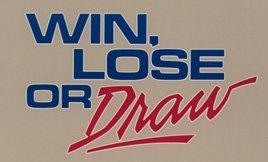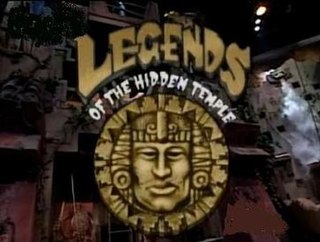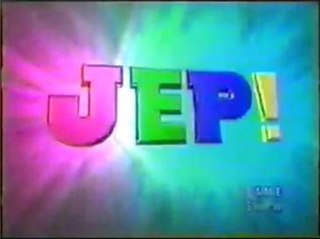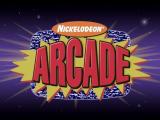
A trilon is a three-faceted prism-shaped object.

Double Dare is an American television game show on which two teams compete to win cash and prizes by answering trivia questions and completing messy stunts known as physical challenges. It originally ran from 1986 to 1993. A revival ran in 2000, and a new revival began on June 25, 2018.

Supermarket Sweep is an American television game show. The format combined an ordinary team-based quiz show with the novel concept of a live, timed race through a supermarket. In the timed race, cameras followed the teams with shopping carts through a large vacated supermarket with several aisles; the value of items thrown into the cart determined the winning team. The original show was broadcast on ABC from December 20, 1965 to July 14, 1967. Revivals aired on Lifetime from February 5, 1990, to June 16, 1995, and later from April 3, 2000, to May 23, 2003, with reruns airing until March 26, 2004.

Win, Lose or Draw is an American television game show that aired from 1987 to 1990 in syndication and on NBC. It was taped at CBS Television City, often in Studios 31, 33, and 43 at various times. It was co-produced by Burt & Bert Productions and Kline & Friends for Disney's Buena Vista Television. It has also had two versions on The Disney Channel: Teen Win, Lose or Draw from 1989 to 1992, and a revived version known as Disney's Win, Lose or Draw which aired in 2014.
Concentration is an American television game show based on the children's memory game of the same name. Matching cards represented prizes that contestants could win. As matching pairs of cards were gradually removed from the board, it would slowly reveal elements of a rebus puzzle that contestants had to solve to win a match.
The Joker's Wild is an American television game show that has aired at different times since the 1970s. Contestants answer questions based on categories determined randomly by a mechanism resembling a slot machine. The show's title refers to the game's slot-machine mechanism also having jokers.

Figure It Out is an American children's panel game show that aired on Nickelodeon. The original series, hosted by Summer Sanders, ran for four seasons from July 7, 1997 to December 12, 1999. The show was revived in 2012, with Jeff Sutphen as host, with the revival airing from June 11, 2012 to July 16, 2013. The series was originally recorded at Nickelodeon Studios at Universal Studios in Orlando, Florida. The revival episodes were filmed on stage 19 at Paramount Studios in Los Angeles.

Legends of the Hidden Temple is an American action-adventure TV game show that broadcast from 1993 to 1995 on Nickelodeon. Created by David G. Stanley, Scott A. Stone, and Stephen Brown, the program centered on a temple that was "filled with lost treasures protected by mysterious Mayan temple guards". Kirk Fogg was the host and served as the teams' guide while Dee Bradley Baker announced and voiced a talking Olmec who "knows the secrets behind each of the treasures in his temple". Six teams of two children competed to retrieve one of the historical artifacts in the temple by performing physical stunts and answering questions based on history, mythology, and geography.

Think Fast is an American children's game show which aired on Nickelodeon from May 1, 1989 to mid-1990, with reruns airing weekly until June 29, 1991.

Get the Picture is an American children's game show that aired from March 18, 1991 to December 6, 1991 on Nickelodeon. Hosted by Mike O'Malley, the show features two teams answering questions and playing games for the opportunity to guess a hidden picture on a giant screen made up of 16 smaller screens. The show was taped at Nickelodeon Studios at Universal Studios in Orlando, Florida. The program's theme music and game music was composed by Dan Vitco & Mark Schultz, and produced by Schultz. Its tagline is The Great Frame Game.

Fun House is an American children's television game show that aired from September 5, 1988, to April 13, 1991. The first two seasons aired in daily syndication, with the Fox network picking it up and renaming it Fox's Fun House for its third and final season.

A treasure hunt is one of many different types of games for players who try to find hidden objects or places by following a series of clues. Treasure hunt games may be an indoor or outdoor activity. Outdoors it can be played in a garden, indoors it can be played in a specific room, which would make the work of hiding the clues harder.
Pictionary is a children's game show based on the board game of the same name, in which two teams of three children competed in a drawing game for prizes. One of the versions was hosted by Brian Robbins, and aired on June 12 to September 8, 1989, with 65 episodes. The show was distributed by MCA TV and produced by Barry & Enright Productions.

Jep! is an American children's television game show, adapted from the quiz show Jeopardy!. It aired first on Game Show Network throughout the 1998–99 season, and then on Discovery Kids through late 2004. It was hosted by cartoon voice actor Bob Bergen, and created by Scott Sternberg who had earlier created Wheel 2000, a children's version of Wheel of Fortune. The show's production involved many of the daily syndicated Jeopardy!'s then-current personnel, including director Kevin McCarthy and four of the nine writers that the show employed at the time, and Alex Trebek, the main Jeopardy! series' host, served as Jep!'s creative consultant. Unlike the main Jeopardy! series, Jep! was taped at Stage 11 of the Sony Pictures Studios, rather than Stage 10.
Finders Keepers is a CITV game show based on the original American format of the same name. It was originally broadcast between 12 April 1991 and 6 August 1996, hosted by Neil Buchanan. It was then revived from 6 January to 14 April 2006, hosted by Jeff Brazier.

Nick Arcade is an American children's game show created by James Bethea and Karim Miteff and hosted by Phil Moore, with Andrea Lively announcing, that aired on Nickelodeon in 1992, airing originally during weekend afternoons, with reruns airing until September 28, 1997. It was taped at Nickelodeon Studios at Universal Studios Florida in Orlando. In Nick Arcade, two teams of contestants played two initial trivia rounds, with the winner advancing to the "Video Zone" to play against the virtual "Video Game Wizard" of the day.

Estate of Panic is an American reality show in which seven strangers compete to find cash in a large estate. The show is hosted by Steve Valentine, and produced by Endemol USA.

Wheel of Fortune is an American television game show created by Merv Griffin that debuted in 1975. The show features a competition in which contestants solve word puzzles, similar to those used in Hangman, to win cash and prizes determined by spinning a giant carnival wheel.
Jeopardy! is an American television game show created by Merv Griffin. The show features a quiz competition in which contestants are presented with general knowledge clues in the form of answers, and must phrase their responses in the form of questions. The original daytime version debuted on NBC on March 30, 1964, and aired until January 3, 1975. A weekly nighttime syndicated edition aired from September 1974 to September 1975, and a revival, The All-New Jeopardy!, ran on NBC from October 1978 to March 1979. The current version, a daily syndicated show produced by Sony Pictures Television, premiered on September 10, 1984.

Celebrity Name Game is an American syndicated game show which premiered on September 22, 2014. Based on the board game Identity Crisis, the series was developed by Courteney Cox and David Arquette's Coquette Productions, and was originally pitched as a primetime series for CBS with Craig Ferguson as host. The series was later picked up by FremantleMedia and Debmar-Mercury as a syndicated series for 2014 with Ferguson, who left The Late Late Show on December 19, 2014, remaining as host as well as an executive producer. The series marks Coquette's first foray into game shows. The show was subsequently renewed for a second season, which premiered on September 21, 2015.






















